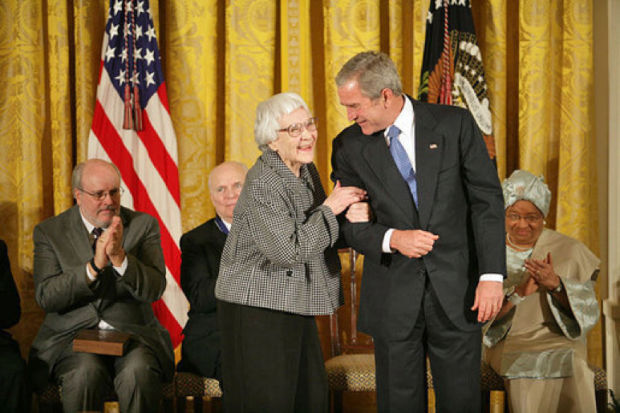Harper Lee used the words “Methodist” and “John Wesley” in the first pages of her classic novel “To Kill a Mockingbird,” and Methodism figured in her life as well as her fiction.
Lee’s death on Feb. 19, at 89, in her hometown of Monroeville, Alabama, brought expressions of sadness from fellow United Methodists.
There was also deep gratitude for her work, particularly “To Kill a Mockingbird,” a Depression-era tale of race relations in the Deep South, published in 1960.
“It’s not only a great piece of art, but it really is a grappling with America’s greatest problem,” said retired United Methodist Bishop Will Willimon, who led the North Alabama Conference.
The Rev. Matt Rawle, a United Methodist pastor and author of the book "The Faith of a Mockingbird," posted this on his blog: "Harper Lee will be missed, but her story will continue to focus an incarnational light shining toward justice."
Dawn Wiggins Hare, top executive of the United Methodist Commission on the Status and Role of Women, knew Lee as a fellow resident of Monroeville and fellow member of First United Methodist Church in that town.
“Imagine the strength of character, the undaunted courage, the ethical heart that a young 30-something woman from south Alabama would have to have to write a book about racial injustice before the Civil Rights Act had even passed,” said Hare, a former Alabama judge. “It took clarity of vision to see injustice in what was otherwise accepted as the norm.”
Deep Methodist roots
Born Nelle Harper Lee, the author grew up Methodist and was a longtime member of First United Methodist Church in Monroeville. Hare called the Lee family the “backbone” of the church and noted that the stained-glass windows in its chapel were given in honor of Lee’s parents.
Lee’s older sister, Alice, who died in 2014 at age 103, was a lawyer and a leading layperson in the local church as well as the first woman to lead the Alabama-West Florida Conference delegation at General Conference.
Harper Lee attended United Methodist-related Huntingdon College in Montgomery, Alabama, in 1944, later transferring to the University of Alabama.
“Her words resonate with evidence of personal and social holiness that reflect her Methodist heritage, which she held dear,” the Rev. J. Cameron West, Huntingdon’s president, said in a statement Friday.
Lee attended law school, but chose writing as her career, working as an airline ticket agent in New York while making her first efforts at fiction in her spare time. Friends surprised her with a monetary gift that allowed her to focus fulltime on her writing, and “To Kill a Mockingbird” was the ultimate result.
The novel references Methodism on the first page as it sketches the family background of the fictional Finch family at the center of the story. The second page mentions John Wesley, Methodism’s founder.
Mostly, the story is a coming-of-age tale in which a young daughter, Scout, observes her father, Atticus Finch, bravely challenge local racial mores by representing a black man falsely accused of rape.
Prodding a nation
After “To Kill a Mockingbird” came out in 1960, winning the Pulitzer Prize and becoming a popular film with Gregory Peck as Atticus, Lee published almost nothing for decades. Meanwhile, “To Kill a Mockingbird” would gradually become one of the all-time best-selling novels, not least because of its status as a staple of secondary school required reading lists.
Last year, her novel “Go Set a Watchman” came out amid controversy over whether it represented a finished work or a less-accomplished draft of “To Kill a Mockingbird,” belatedly published for commercial reasons.
This novel, whose title comes from a verse in Isaiah, also includes Methodist references. Atticus Finch is less noble in the second book, which is set in the 1950s as the civil rights movement grew and the U.S. Supreme Court ordered an end to segregated schools.
Willimon is a champion of both novels.
“White male Southern Methodist that I am, I think reading both of those books together is like having my life narrated back to me,” he said.
Former President George W. Bush, a United Methodist, awarded Lee the Presidential Medal of Freedom in 2007. He released a statement saying he and wife Laura were mourning Lee’s death.
“Harper Lee was ahead of her time, and her masterpiece ‘To Kill a Mockingbird’ prodded America to catch up with her,” Bush said.
Hare stressed that Methodism helped shape Lee, and Lee honored Methodism with her life and work.
Lee, she said, “is a shining example of the capacity of a lay person to see injustice, speak up, tell the story, and transform the world. We as United Methodists define our mission as making disciples for Jesus Christ for the transformation of the world. Those were not just words to Nelle Harper Lee. That was her legacy.”
Hodges, a United Methodist News Service writer, lives in Dallas. Contact him at (615) 742-5470 or newsdesk@umcom.org
Like what you're reading? Support the ministry of UM News! Your support ensures the latest denominational news, dynamic stories and informative articles will continue to connect our global community. Make a tax-deductible donation at ResourceUMC.org/GiveUMCom.




